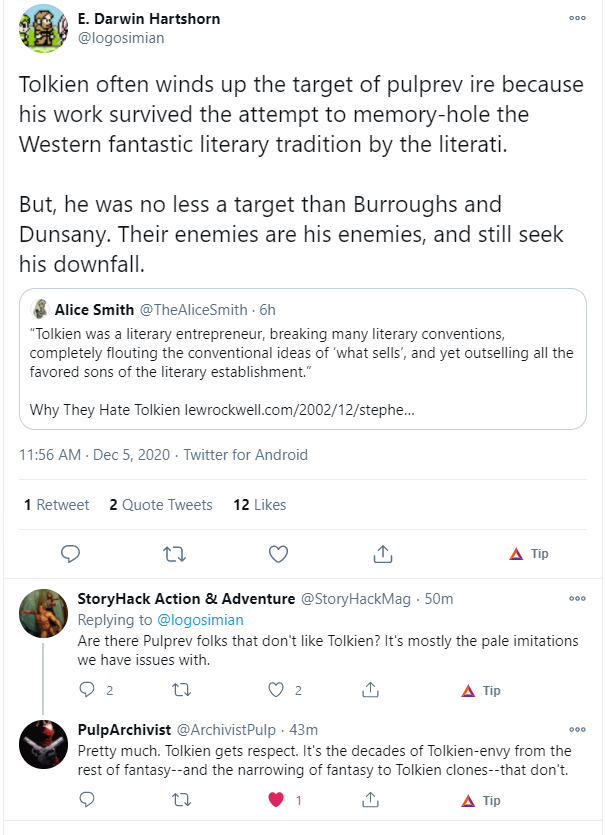Penny Dreadfuls
![Tim Powers put Spring-heeled Jack in The Anubis Gates [Amazon link]](https://www.benespen.com/content/images/content/v1/51259dfce4b01b12552dad3e/1607265980989-KA2WT2Y88MDDPMBOJOMU/unnamed-281-29.jpg)
Tim Powers put Spring-heeled Jack in The Anubis Gates [Amazon link]
So despite what I just said, I am going to look to something G. K. Chesterton wrote almost 120 years ago, because it is still true. And while I appreciate JD Cowan’s analysis of what went wrong in popular culture in the last twenty years, in another sense very little has changed in the Western mind in the last hundred years at least.
Eleven years ago, I briefly commented on Chesterton’s defense of penny dreadfuls, and in the time since I’ve only come to appreciate Chesterton’s position more.
One of the strangest examples of the degree to which ordinary life is undervalued is the example of popular literature, the vast mass of which we contentedly describe as vulgar. The boy's novelette may be ignorant in a literary sense, which is only like saying that modern novel is ignorant in the chemical sense, or the economic sense, or the astronomical sense; but it is not vulgar intrinsically--it is the actual centre of a million flaming imaginations.
…
…people must have conversation, they must have houses, and they must have stories. The simple need for some kind of ideal world in which fictitious persons play an unhampered part is infinitely deeper and older than the rules of good art, and much more important.
…
If the authors and publishers of Dick Deadshot, and such remarkable works, were suddenly to make a raid upon the educated class, were to take down the names of every man, however distinguished, who was caught at a University Extension Lecture, were to confiscate all our novels and warn us all to correct our lives, we should he seriously annoyed. Yet they have far more right to do so than we; for they, with all their idiocy, are normal and we are abnormal. It is the modern literature of the educated, not of the uneducated, which is avowedly and aggressively criminal. Books recommending profligacy and pessimism, at which the high-souled errand-boy would shudder, lie upon all our drawing-room tables. If the dirtiest old owner of the dirtiest old book stall in Whitechapel dared to display works really recommending polygamy or suicide, his stock would be seized by the police. These things are our luxuries. And with a hypocrisy so ludicrous as to be almost unparalleled in history, we rate the gutter-boys for their immorality at the very time that we are discussing (with equivocal German professors) whether morality is valid at all. At the very instant that we curse the Penny Dreadful for encouraging thefts upon property, we canvass the proposition that all property is theft. At the very instant we accuse it (quite unjustly) of lubricity and indecency, we are cheerfully reading philosophies which glory in lubricity and indecency. At the very instant that we charge it with encouraging the young to destroy life, we are placidly discussing whether life is worth preserving.
Books of course come in flavors all over the spectrum that ranges from pulp trash to fine literature. At least in my experience, my enjoyment of a book is orthogonal to where on that high art to low art spectrum a book falls. Many of my favorite works are really hybrids, adventures with a clear sense of morality, that allow the author to wax eloquent about some subtle concept, or educate you in some useful principle of science or engineering.

Many arguments in genre fiction often come down to where a work or an author is perceived to fall on the high art / low art scale, often with an implied background of class status, as Chesterton so deftly points out. Works that are enjoyable and commercially successful will be derided if they are seen as low-class. Whether said works are any good is course another question entirely.
![The Great American [Adventure] Novel](/content/images/size/w720/2025/09/960px-Albert_Bierstadt_-_A_Storm_in_the_Rocky_Mountains-_Mt._Rosalie_-_Google_Art_Project.jpg)


Comments ()